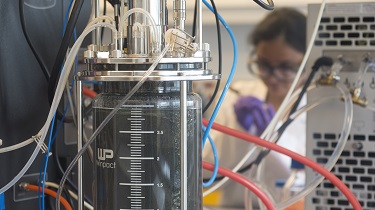Genecis Bioindustries takes circular economy to the next level with eco-friendly plastics
The leftover food you scrape off your plate and into the trash could soon be used by major brands to make items like surgical supplies, flexible packaging and even children’s toys.
While using bacteria to make compostable bioplastics from food might sound like science fiction, it’s happening right now—and driving the circular economy at a whole new level.
Pioneered by Toronto-based Genecis Bioindustries, this sustainable process costs up to 40% less than comparable technologies. That’s because it harnesses abundant supplies of food waste (more than 1 trillion pounds is generated each year worldwide) instead of expensive corn and sugarcane crops.
It can also cut greenhouse gas emissions by 80% and make a sizable dent in the 300 million tons of pollution-causing, single-use plastic wasted each year.
The company, which won EDC’s pitch competition during Cleantech Export Week 2021 for its innovative solution, achieves this through manufacturing an eco-friendly alternative to plastic: natural polymers called PHAs, or polyhydroxyalkanoates.
The PHAs are produced by specially selected bacteria in Genecis’s two-stage fermentation process. First, food waste is fed to a set of bacteria, which convert it into fatty acids similarly to how a human stomach digests food.
Next, the fatty acids are fed to a different set of bacteria, which make PHAs in their cells as a form of fat or energy storage. An extraction process is used to break open the cell walls of millions of those bacteria to collect the PHAs, which are then made into bioplastic pellets and sold to plastics manufacturers to make packaging, textiles, car parts and countless other items.
Thanks to their unique properties, eco-friendly PHAs have the potential to replace 60% of the world’s petroleum-based plastics, says Luna Yu, Genecis founder and CEO.
“We found them to be the most truly sustainable solution, as they are not only fully recyclable and circular but also easily biodegradable in nature,” she says, pointing out that PHAs degrade within a year on land and fewer than 10 years in marine environments. In contrast, synthetic plastics can take hundreds of years to break down.
PHAs also don’t get affected by the recycling process and can be easily moulded and remoulded into other high-value products without affecting quality. The entire manufacturing process for PHAs takes less than seven days, while converting food waste into biogas takes an average of three weeks, she says.
Genecis is only beginning to scratch the surface of the booming market for PHAs, says Yu, who is currently working with Novo Nordisk. It’s a relationship with significant earnings potential, as the Danish multinational pharmaceutical company produces half the world’s insulin.
“We established a subsidiary in Denmark to better serve Novo Nordisk and break into the biotech ecosystem there. Through this partnership with a large biotechnology company, we can scale up and learn disproportionately faster.”
With 30 full-time employees and a 7,000 square foot pilot facility that houses more than 20 bioreactors of bacteria, the company has come a long way since its humble beginnings in 2017. In 2021, the rapidly rising star was shortlisted as one of six finalists for the prestigious Women in Cleantech Challenge run by MaRS and NRCan.
“When we were just starting out, we had to make bioreactors out of retrofitted rice cookers to save money. Now we’ve closed $1.2 million in revenue and $10 million in purchase orders from Fortune 500 companies,” she says. “Our extreme focus on building something that customers need has allowed us to easily demonstrate clear market applications and landed us great partnerships.”
“To date, we’ve raised $15 million from investors and government agencies. There’s a huge demand right now for PHAs and we don’t even have enough to execute all our purchase orders. We’re sold out for the next two years.”
To meet demand and scale as quickly as possible, Genecis is using $6 million in funding from Next Generation Manufacturing (NGen), the industry-led organisation behind Canada’s Advanced Manufacturing Supercluster, to collaborate with the StormFisher Resource Recovery Centre in Drumbo, Ontario. The partnership will allow Genecis to benefit from the existing infrastructure of one of Canada’s largest biogas plants.
“They have all the permits and utilities, and all the concrete is poured, which allows us to scale five times faster within one-tenth of the cost, compared to having to build everything from scratch,” says Yu.
“In turn, a lot of the waste that comes out of our process that we can’t utilize can be put back into the biogas process. They can use our technology to create two revenue streams instead of one.”
“It’s a great symbiotic relationship that allows us to leverage existing plants, make them carbon-negative and make us grow exponentially faster as a company.”
As part of that growth plan, EDC has a funding solution in place that allows Genecis to provide upfront payment in their polymer development projects.
“EDC helped RBC underwrite the coverage for our 2020 Scientific Research and Experimental Development submission,” says Yu. “This enabled us to invest in the equipment and capacity we needed to deliver on stage-gated projects and has been transformational for several of our existing projects that span over multiple years.”
“We’ve now successfully completed the development phase for one of these projects and will be co-launching a white-label product at the end of this year that will be sold to consumers worldwide by multiple Fortune 500 brands.”
EDC is currently working on an additional financial solution that will allow Genecis to undertake even more projects in the future. Considering the speed of its evolution in less than five years, this Canadian small business is well on its way to becoming an important market player in the science of turning waste into something of value.
To find out more about how EDC can help, click here

